#denotation vs connotation
Explore tagged Tumblr posts
Text
The way I see it there's a denotation and connotation. Dude may have shifted definitions over the years and now its colloquial denotation is just a fun thing to call people or apparently things. However, the connotation is still a masculine term like, "a couple of dudes" makes most people think of a pair of masc presenting individuals. You can try to salvage a term (like the LGBTQIA+ community reclaimed "Queer") but we need to be conscious and open minded to how a term's connotations affect people. They may not hold the same emotions to a word and it may have been used to hurt them before.
Reblog if you have used dude as a non gender specific term.
#please don't call me dude#or bro#I'm not a guy or one of the guys#denotation vs connotation#queer#validate me#trans
443K notes
·
View notes
Text
Once again if you don’t know what this is about, spare yourself…
It’s not about the word “gringo” itself, goddamnit!!
It’s about people telling Black Americans “you’re a privileged westerner” as an excuse to invalidate their voices. It’s about being willfully ignorant towards the literal centuries of oppression towards Black Americans to win a stupid internet argument.
The people saying these things do not understand what it’s like to be a minority in your own country. No one is denying that westerners have privilege but being an immigrant or a POC in a majority white country is a vastly different experience than being a white person in that country.
#please go back to school and learn about connotation and denotation again.#you can use words that aren’t inherently offensive in an offensive way#I.e. ‘He is an immigrant’ vs ‘those goddamn illegal immigrants are stealing our jobs’#it’s not about the word it’s about the disrespect. this isn’t a etymology debate ffs
8 notes
·
View notes
Text
Mutuals and friends of mutuals: I'm pretty sure one of you somewhere understands Latin conjugation etc? I am trying to alter the phrase "deus ex machina" to mean something along the line of "god outside the universe" (i.e. taking the trope's concept of intervention from outside the story and making it intervention from outside the universe) but Google translate is being expectedly unhelpful
#would greatly appreciate if someone can give pointers!#based on google translate i've come up with the options of 'deus ex universo' and 'deus extra universum'#but i'm pretty sure there's conjugation stuff going on i don't understand with 'universe'#and also that there is possibly some denotation vs connotation confusion with ex vs extra#language
18 notes
·
View notes
Text
Angel Pinky Rings
I'm going to get strangely obsessed with finger jewelry for a moment.
Please do not ask Neil Gaiman to confirm or deny.
Before the Beginning, Aziraphale doesn't have a ring:
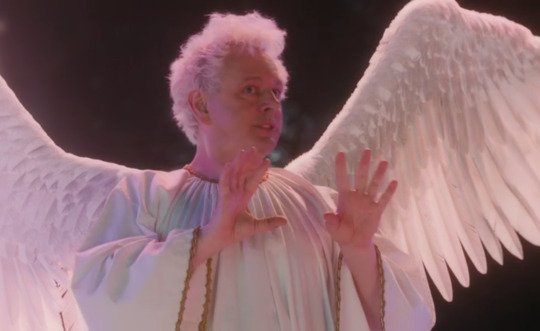
...then after the Beginning, he does:

...which he wears continuously for the rest of the story:

Archangel Michael
doesn't have a ring in Book of Job:

and then they do:

Uriel does:

...even Saraqael does:

...and Sandolphon:
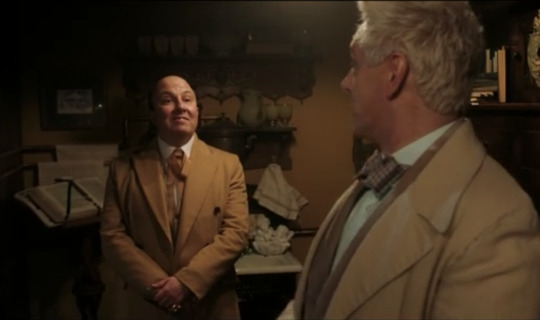
...but not the Supreme Archangel
not in Book of Job:

and neither before Armageddidn't:

nor after:
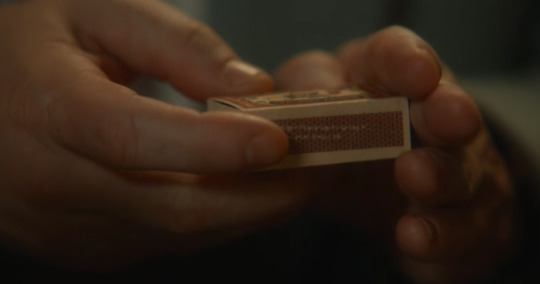
...and not the 37th Order Scrivener:
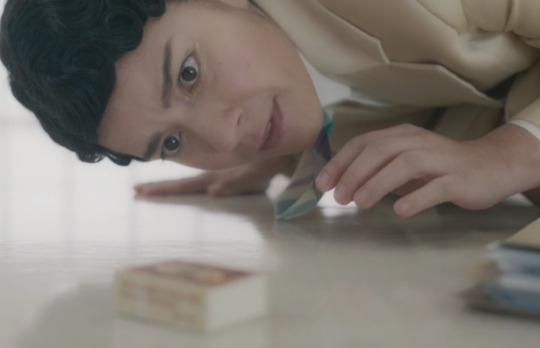

Originally I thought the rings might denote rank, but Gabriel not having a ring throws a wrench in that.
Left vs. Right
Every angel that wears a ring wears it on their left hand (everyone except Saraqael wears it on their pinky, who wears it on their ring finger) except for Aziraphale, who consistently wears his pinky ring on his right hand. Furthermore, the style of each ring appears to be unique; we don't usually get a very good look at them (or at least I don't, I have kind of crappy hardware) but the differing styles seem to be meaningful to the individual. Putting it on the left may indicate that it has a negative connotation; the fact that Aziraphale's ring is on the right sets him apart.
Protecting the Ring
Additionally, all the angels that have rings, when they fold their hands, tend to cover up their ring-bearing hand, almost protectively:



Semi-Rational Theory
The rings are vessels of memory: they are only worn by angels who have transgressed against God's will, and are worn forever after as a symbol of the covenant made between the Creator and the Servant. They dump the memories of their transgressions into the ring so that their minds are made clean, but carry the mark of their prior sin with them for the rest of time. Much like a rainbow, it serves as a promise that the transgressor will never transgress again. The angels protect it because, consciously or not, they know that this ring contains a part of themselves, and it is both precious and shameful.
Absolutely Irrational Theory
Aziraphale wears his ring on his right hand because it doesn't fit on his left. That's because it's not actually his ring; it is Angel!Crowley's, and he is keeping it safe for them. Crowley and/or Aziraphale might not even know anymore that that is what it is, but by some pact between them made before the Fall, it is in Aziraphale's stewardship to keep safe until such time as Crowley can safely have his memories restored.
Again: Please do not ask Neil Gaiman to confirm or deny.
EDIT: MAGGIE HAS A PINKIE RING
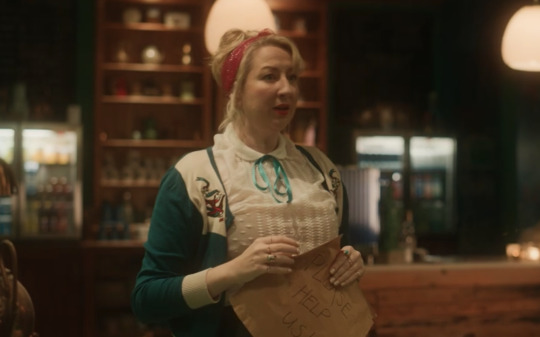
This bish is sus AF
~~~~~~~~~~~~~~~~~~~~~~~~~~~~~~~~~~~~~~~~~~~
If you would like to reblog, please reblog from this repost with additional content and references.
~~~~~~~~~~~~~~~~~~~~~~~~~~~~~~~~~~~~~~~~~~~
To read more of my original content on erasure theory:
Jimbriel, Satan, the Book of Life, and what it means for Crowley
The Erasure of Human!Metatron
Baraqiel and Azazel
or, my first and my most popular post to date:
A Nightingale Sang in 1941
#good omens#good omens 2#good omens meta#archangel gabriel#archangel michael#archangel uriel#saraqael#sandolphon#erasure theory#ivoc#aziraphale#aziraphale x crowley#ineffable husbands#angel!crowley#angel rings#ring theory
772 notes
·
View notes
Text
what bothers me about people not understanding how "expat" vs "immigrant" are politicized terms that have connotations outside of their most literal dictionary definitions is that many people have emphasized that the difference between expat and immigrant is just that expats intend to go home and immigrants intend to stay (and then some comment about how i "must not live abroad" or am talking about the USA specifically lmfao) and because you are insisting on talking about how im just a stupid idiot who doesn't understand English and am adding politics to something needlessly, i want to point out that there are many people labelled as 'immigrants' in the west - global southerners who work or live in the north - who do not intend to stay forever or become citizens or even permanent residents, they are here in the west to work or for other reasons, and fully intend to go home. but they are never called expats in common vernacular, you will never hear canadians or brits or french people referring to "Filipino expats" or "Nigerian expats" or "Colombian expats" if you are racialized you are an immigrant. my father experienced this for over 20 years!!
and speaking about Malaysia, my home country, you do not typically hear about Filipino expats or Indonesian expats, even when they are people who have come to Malaysia to work temporarily. the term 'expat' is both racialized and denotes a specific class status in this context. you can cite however many dictionaries you want and call me an illiterate brown person because youre Australian and you moved to Thailand and thus you are the Lord of Migration and the Immigration Understander but you are just proving my point
#english is my native language. i am also malaysian born#please continue to oscillate between saying i am somehow both from the us and have never left + insisting i dont understand english
159 notes
·
View notes
Note
If it’s alright, I have a question about Vil and Epel’s relationship. I understand that the accent changing plot line is just a cultural politeness thing that didn’t carry over outside of Japan, but the other parts of changing Epel’s behavior don’t quite make sense.
Why exactly is Epel being forced to call macarons his favorite food? And act very soft-spoken? I can’t see how these fit in with the politeness aspect of the table manners, no abrasive language, etc. It just doesn’t give a very good impression, especially in combination with the unfortunate implication of giving Epel a Southern accent for the “change your accent” plot point.


Before I get to responding to the questions posed by this ask, allow me to explain for those who may not be familiar with this controversy! This is so we can all go into reading this post from the same starting point.
I've made titles to denote the explanation of background knowledge and to denote responding to the questions actually asked to me! If you're already familiar with the Vil-Epel-accent debacle then feel free to skip the first section!
Disclaimer: I’m speaking on these concepts as I personally understand them. However, I am not a native Japanese speaker so I’d advise that you consult additional resources with a better understanding of the language and culture. Two resources I enjoy are Yuurei and MysteryShopTLs, who have both also addressed Epel’s accent and how it was localized.
The Accent, EN vs JP
It’s well-known that Epel is a character with a heavy accent who has been explicitly told by Vil, his dorm leader, to alter the way he speaks. In EN, Epel speaks with what appears to be a southern (as in, “from the southern United States”) accent. Therefore, when Vil tells him to stop speaking in the accent, it feels as though Vil is shaming him for his southern roots and culture. This has also led to fans (especially of the EN-only sphere) thinking that Vil believes Epel’s accent is “unrefined” and “makes him sound uncouth/uneducated”, which is why Vil tells Epel to cover it up. I have even received asks conveying as much in the past (here is one example).
In the original JP, Epel speaks in a way that does not closely resemble any real-world Japanese dialect but rather a blend of them. If you ask a native Japanese speaker, they would likely tell you that it is difficult to understand what Epel is saying and that it sounds as though he is speaking rudely or too casually. People could genuinely take offense to the accent because it can be mistaken as something else entirely. This is obviously very different than the real-world accent (which many people can still understand and wouldn’t perceive as rude) that Epel was localized to have. The decision to give him a southern accent, then, does not completely carry over its original JP connotations into EN.
What remains the same in both EN and JP is the reason Vil provides for telling Epel to adjust the way he communicates. As he says in EN, “Speak properly" to which Epel immediately assumes the command comes from a place of elitism/classism and Vil thinking Epel's manner of speaking is beneath him. Vil responds with, "Stop misinterpreting my instructions. I have nothing against your home or its dialect. What I object to is your attitude. Being proud of your home is all well and good, but there is a time and a place for that. The way you address your superiors is entirely unacceptable." (Keep in mind that before this, Epel was the one instigating a fight with Vil and subsequently got his ass whooped for disrespecting an upperclassman. As the victor, he declares that Epel must do as he says--that's the "culture" of NRC. The weak obey the strong, so if Epel wants to do whatever he wants, then Vil challenges him to beat Epel in a fight. Until then, the loser must obey the winner. Epel agrees to these conditions.) This may be a little hard for western English speakers to wrap their heads around, but MANY Asian countries, Japan included, run on a hierarchical system which is embedded even into their languages. Japanese, for example, has honorifics to denote the relationship between the speaker and the listener, as well as variations on the same word depending on the context ("boku", "ore", "watashi", "atashi", etc. are all valid ways to refer to oneself, "onii-san", "onii-sama", "aniki", "kyodai", etc. are all ways to refer to a brother, whether blood-related or not). In some cases, it's considered rude to call others by their first name unless you know them well, and even then it's not common to see a first name without an honorific. This is not as strictly adhered to in English, which is perhaps where a cultural disconnect occurs. What Vil is referring to in his instructions to Epel is what is known in the world of linguistics as "code switching", or changing how one communicates to suit the situation. Part of code switching is changing one's "register", or the level of formality you use. So for example, I could use a colloquial/casual register when I speak with my friends, but I may shift to a more polite and formal register when I speak with my professors, a boss, or an older relative. Vil, then, is critiquing Epel for not speaking politely to his seniors (something which is expected in Japanese culture, but not expected among those in similar grade levels in western cultures).
In the Harveston Sledathon event, we get to venture to Epel's hometown and hear how the locals speak. Indeed, we get more instances of people who speak in the same way Epel does. It's the Harveston dialect, which is so distinctive that it basically sounds like a whole different language. (There are also languages like this in real life; consider Mandarin and Cantonese; technically they are both "Chinese" but Mandarin and Cantonese speakers would not be able to comprehend one another even if they use the same written language). However, it's notable that Marja (Epel's grandmother) and the mayor of Harveston are able to code switch flawlessly into a more standardized tongue. They explain that this is a skill they have developed because it helps in communicating with tourists/visitors to the village and for whenever they travel to the nearby city to sell their wares. This reinforces Vil's point that there is a "time and place" for certain ways of speaking, which Epel needs to consider.
Macarons and Soft-Spokeness
Accent thing aside, some English-speaking fans take issue with Vil's stern treatment of Epel, particularly in instances in which Vil seems to be exerting significant control over his underclassman's behaviors. (Japanese-speaking fans largely do not hold the same sentiment.) Examples of this include Vil forcing Epel to state that his favorite food is macarons, as well as making Epel present as soft-spoken even when he's just among his peers. I will now be addressing both of these points. TO BE CLEAR, I am NOT trying to defend Vil but rather I'm just going to speculate about why the circumstances are the way that they are and/or why perceptions of his attitude may differ.
Starting with macarons! It is stated in Epel's official profile and by Epel himself in his Birthday Boy vignettes that his favorite food is yakiniku (Japanese grilled meat). However, macarons are also listed as his favorite food, and this is notable because he's the only character with two foods listed instead of just one. In the aforementioned Birthday Boy vignettes, Epel is quick to qualify his love of meats with, "Well, I do have one thing I like even more. It's, ah, macarons." When asked what he likes about them, he says, "They're... cute. And sweet! And they come in lots of different flavors." His voice here sounds hesitant, so it's not clear whether he's being entirely honest or not. He even admits in a whisper that, "[Macarons] are not very filling, but still." Epel again complains about macarons being good but not very filling when he has some in the City of Flowers/Fleur City. To this, Azul asks, "Why do you look so unimpressed, Epel? I thought macarons were your favorite food. [...] But was my intel mistaken? Would you prefer something with a stronger flavor profile?" Epel insists he is fine, and Azul responds with, "Excellent, then my intel bears out." This creates some confusion over whether Epel actually likes macarons or not. I doubt that the information Azul has on others is inaccurate. Plus, Epel states of his own free will to the player (who is interviewing him) that he also likes macarons. This leads me to believe that while Epel doesn't outright hate macarons, he does like them alright (but still prefers grilled meat more). The only thing he seems to have an issue with is how unsubstantial macarons are as a food item.
Now... why does Vil make him state that macarons are his favorite food instead of grilled meat? It's sort of touched on in Epel's Ceremonial Robes vignettes. In them, Vil chides Epel for his poor table manners and asks him to state his favorite food. Epel responds with grilled meat/barbeque, which earns him a smack from his dorm leader. (Vil actually smacks Epel multiple times in these vignettes as punishment, which ended up being another source of ire in the English-speaking part of the fandom; such a thing is more common in Asia and its media, so it's not seen as too outrageous in Japan.) "Do my ears deceive me?" Vil says. "I could've sworn I heard a word unfit to be spoken in this noble dorm. I will ask you again. As a student of Pomefiore–a dorm founded upon the tenacity of the Fairest Queen–what is your favorite food?" From this dialogue, it can be surmised that Vil's reasoning for drilling the macarons in as Epel's favorite food is because it is something that is more befitting of the regal "image" of the Fairest Queen and the dorm made in her honor. Vil seems to regard grilled meat as an inelegant food which does not suit the Fairest Queen nor Pomefiore.
The second thing the asker brought up is Epel's soft-spokeness. I guess I'm a little confused by this??? Soft-spokeness is a part of being polite; it ties back to volume control (ie "indoor voice" being softer than "outdoor voice"). I also don't recall a specific instance of Vil chastising Epel for NOT being soft-spoken at all times. He allows Epel to be loud sometimes and raises his voice himself. I feel like volume is not something that Vil harps on as much as other things like cursing or speaking politely to the correct authority figures (unless, of course, volume is important to the level of politeness required for the current conversation). I could be wrong on this though, so please let me know if you know of any specific instances of Vil being mad about Epel speaking loudly that I may have missed! What I do find odd is how... consistently (?) Epel tries to keep polite even when Vil is not around to monitor him. When Vil and Epel first met, Vil makes it clear that there is a "time and place" for Epel's accent, and it's not when addressing seniors. So... by the logic, shouldn't Vil be okay with Epel acting more relaxed or rowdy around first years or more casual settings in general? Why does Epel need to maintain the facade of being polite even when not in the presence of his superiors? Why does Epel seem to even act fearful about word of his misbehavior/rudeness getting back to his dorm leader and even make others swear they won't divulge the incidents to Vil?
One theory I'll propose is the entirety of book 5. Vil was insistent then on having Epel in the NRC Tribe. He wanted to weaponize Epel's cuteness, which he believed could compete with his long-time rival, Neige. This probably fed into Vil's demands for Epel to appear and act dainty and innocent, traits which Neige effortlessly possesses. Vil literally even refers to Epel as his "Poison Apple" that will help him defeat Neige. After book 5, Vil seems to have eased up on his rigidity. However, I will caution that this explanation may or may not align well with vignettes and/or event stories, which do not always work in a cohesive timeline with the main story.
Perhaps a more all-encompassing explanation is... this is probably because Vil is just very strict about how his dorm members present themselves at all times, since they are expansions of Pomefiore and of himself as the leader. Both the macarons and Epel's attitude are reflections of the dorm he (a celebrity who is very aware of the public eyes on him + his reputation) is affiliated with, and Vil won't have them poorly represented. He is the dorm leader, so he has the "right" to rule and impose his ideals as he sees fit. It's a similar situation to Riddle forcing the Heartslabyul students to follow silly, nonsensical rules (because they're tradition) or risk a scolding or a beheading. And again, Epel is following along because (as established in book 5), he has agreed to submit to Vil’s orders until he beats Vil in combat.
At the end of the day, I don't think Epel being forced to call macarons his favorite food is a huge deal. Is anything that big lost in claiming you like something that isn't your actual favorite food? It's not like Vil is forcing Epel to claim he likes eating something that would actually harm him (like, if Epel had an almond allergy or something).
What's more dubious is how VIl governs Epel's attitude and temperament at seemingly all times (to the point of eliciting some apprehension from Epel). Given the most generous reading, maybe it's Vil's way of teaching Epel maturity and how to keep his voice down since Epel had zero of it and acted loudly brazen when he first enrolled. It doesn't help Epel if he's quiet and well-mannered in very limited social situations; it has to be "generalized" or expand to other scenarios for Vil's lessons to truly be instilled in him. (Like... what would happen if Vil DIDN'T hold Epel in check? His classmates would not be able to understand Epel's speech, and he might get into trouble by picking fights with others.) This is a life skill that Epel lacks, unlike his grandma and the Harveston mayor, and Vil's teaching it to him via "tough love" (though whether you approve of his methods or not is up to interpretation). Recall that Vil also teaches Epel to embrace femininity as its own strength and to disregard outdated gender norms--this could be considered another "lesson". I doubt that anything Vil imposes is done maliciously, but rather comes from a place of wanting others to be better and to shine their brightest, even if that path is difficult or painful. Epel, as the rebel in this circumstance, of course does not enjoy being told what to do and misbehaves in small ways. There’s a limit on how much he can misbehave though, as it would hurt his pride to be reminded of his failure to one-up Vil. He's like a kid that doesn't want to be caught cussing or acting out by his parent. It can be seen as immaturity and an unwillingness to change or to grow up, but it can also be seen as someone who wants to freely be able to express themselves or to be their "truest" self. Epel is rowdy and headstrong, and it's difficult for him to repress these parts of himself. Given the least generous reading, Vil is oppressing and stifling Epel in many ways that extend beyond what his dorm leader position should reasonably allow him to do. In fact, a popular fan translation for book 5 is "The Beautiful Oppressor", as Vil is frequently shown limiting the liberties of his NRC Tribe members during their training arc, not just Epel's.
Which is the truth here? Why do those in the English side of the fandom decry Vil's actions and side with Epel whereas the Japanese side see little issue with this?
I wager that this predominantly comes down to, again, cultural differences. Many English-speaking fans are based in the west (particularly the USA and Canada, where the EN servers first launched), places which emphasize individuality and self-expression. Of course they would be more likely to take Epel's side, as he's the one trying to be himself and stand out in his own way. Meanwhile collectivism--an ideology which stresses conformity with a group--dominates in the east. They are more likely to see no problems with Vil's actions because, to them, he is acting in the ways he is to "guide" Epel and show him how to best "fit in" with Pomefiore and at NRC. I believe the whole "being soft-spoken" thing also ties back to cultural differences; speaking loudly is something else that can be considered rude in Japan, so it's entirely possible that Vil encouraging Epel to be soft-spoken is another element of politeness that did not translate well to English (as the western world tends to be much louder and more animated in their conversations).
What it boils down to is that the way Vil and Epel's relationship was written did not work well for a western audience, whose values and perspective is VERY different from the original audience TWST had. It appeals far more to a Japanese fanbase than a western one, and has resulted in many misunderstandings or anger about Vil's character because of this.
I'm not sure if I managed to adequately explain everything, but I hope that this at least helps you to see from a different perspective!!
#twst#twisted wonderland#Vil Schoenheit#Epel Felmier#disney twisted wonderland#disney twst#harveston sledathon spoilers#Marja Felmier#notes from the writing raven#question#book 5 spoilers#twst en#twisted wonderland en#Neige LeBlanche#Azul Ashengrotto
208 notes
·
View notes
Text
I’ve said this before in various ways but a lot of the most annoying (to me) fandom discourse basically boils down to a denotation vs connotation problem writ large
46 notes
·
View notes
Text
Some wild musings on the ways the terms for older and younger siblings are the same and different between Thai, Korean, Taiwanese and (to a lesser extent) Japanese shows.
(Please note these are uniformed observational musings typed so my brain will shush and also cause it’s a heatwave right now and I can’t sleep - Australia Problems.)
Okay the mix of shows I am watching right now have got my brain spinning around the ways the terms for older sibling and younger sibling as romantic and non-romantic terms are the same and different across these four countries (based on their depiction in shows, primarily but not exclusively BL shows so like --- no accuracy is guaranteed)
(Please note I use the terms “older sibling” and “younger sibling” throughout this post with the full awareness that these terms in all the languages have broader implications – heck I’m talking about the broader implications – it’s just an easy way to keep track)
What started this spiral was twofold
The use of didi by robot boy in Anti-rest to denote himself as “younger brother” despite the romantic/possessive nature of their relationship
The use of “ge” vs “da-ge” in Unknown and the fact I have seen da-ge translated as brother, first brother and big brother and I really want to know what the da prefix actually means since ge is brother they also use da as a prefix to the general term for “uncle” in H3: MODC (yes I am watching MODC, Yes I know, No I don’t get myself either).
SO MUSINGS
Lets start with Thai!
Thai is interesting because their older sibling term (Phi) and their younger sibling term (Nong) are both gender neutral and widly used, but calling someone Phi can have romantic connotations but calling someone Nong…can’t, (or well rarely/never does).
The BL boys seem to use “Phi Nong gan” as a way of denying romantic relationships, “we’re just brothers” – it’s platonic.
So “Phi” is potentially romantic but Nong isn’t.
However Phi is also casual to use (as in people can use it even with strangers) so there is both intimacy, politeness and casualness all tied up. It’s not formal but calling someone Phi is not necessarily intimate.
Next up Korea!
I find the Korean terms utterly fascinating since they have four different terms for older sibling, all of which gender both the speaker and the recipient: Unni (Y girl to O girl), Noona (Y boy to O girl), Oppa (Y girl to O boy) and Hyung (Y boy to O boy). (Y = Younger, O = Older).
All of these terms seem to be equivalent but some are used more freely than others
Calling someone older sibling in Korean seems to be a mix of intimate and respectful, it inherently acknowledges the age differential that is important in Korean society, sometimes people use the term straight away, especially Oppa, other times (more often) it’s something that is built too, or offered as a progression of comfort/intimacy in the relationship.
Korean, interestingly has one term for younger sibling, dongsaeng, and (like nong) this term is gender neutral to both speaker and recipient. It, like Nong, seems to never get used in a romantic context and, again like Nong, being denoted “dongsaeng” seems to be something to be actively mad about/avoidant of if you have a romantic interest in your “older sibling.”
Also Oppa is interesting since the term is also occasionally used in both Thai and Taiwan and seems to simply denote “Handsome/Dateable boy” in these languaes, without gendering the speaker. (Presumably this is the result of Korean romances being primarily younger girl to older boy so the use of Oppa was most commonly the term for the male leads and this got picked up).
Quickly Japan.
Japan doesn’t seem to use sibling terms to denote romantic relationships at all, in anime (but not what I’ve seen of live action so far) the terms for older sibling are used with strangers (much like Phi) but this is primarily by children and again anime so... (is anime a less reliable representative of normal speaking than BL do we think? Maybe it depends on the anime…or the BL).
Terms include:
Aniki (older sibling) – gender neutral of both speaker and recipient, rarely used in anime, seems to only be used with actual relatives in live action.
Ototo (Younger sibling) – opposite of aniki (also maybe only younger brother, unsure)
Onii-san (or other suffixes) - older brother
Onee-san (or other suffixes) – older sister
And Now Taiwan (and China)
Taiwan is interesting because “ge” is brother but their language seems to come with prefixes that change what kind of brother term it is. I’m only just starting to follow (read: hear) the terms but for example in Unknown right now Lili calls her brothers “ge” but Zhiyuan calls his brother “da-ge” and Lili uses “da-ge” when talking about their oldest brother with Zhiyuan. Yet all these terms are just translated as brother
Meanwhile in MODC, Hao Ting keeps calling Bo Xiangs older man “Uncle” and Boxiang keeps correcting him to “Big brother” but both words (uncle and brother) seem to be using the Da prefix so I think Da may be like… additionally respectful maybe…or formal, it doesn’t seem to be respectful when Haoting uses it lol? So I am thinking “Da” must mean oldest/first or something similar.
If The Untamed is to be believed “Da-ge” is first brother and “er-ge” is second brother but idk for sure
Then we come to my spiral thoughts, because the younger brother term here is “didi” as far as I know, but unlike nong or dongsaeng this term doesn’t seem to automatically denote the younger person to “only a brother (read: platonic).” Our young robot boy in anti-reset being the current example, but not the only. I’ve not heard an older boy denote a younger boy as “only a brother” (nong/dongseang) in Chinese so far using “didi’, though maybe that’s a sign I need to watch even more Taiwanese BL…
Anyway, that’s all for now, sleep is calling.
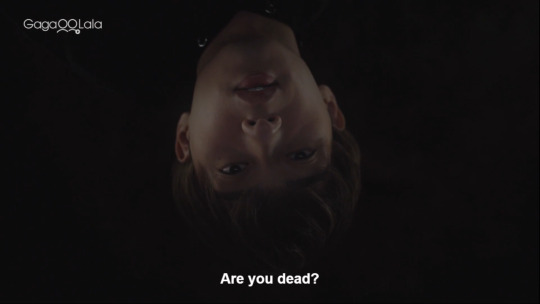
(I would like to reiterate I know nothing and have looked nothing up, this is literally a random English speakers eyes and ears and that’s it, all thoughts welcome, if anything is blatantly wrong, or worse offensive, feel free to let me know)
20 notes
·
View notes
Text
Theories of Direct Reference
Theories of direct reference focus on how certain linguistic expressions (such as proper names, demonstratives, and indexicals) directly refer to objects or entities in the world without the need for intervening descriptive content. Here are some of the main theories and approaches within direct reference philosophy:
1. Causal Theory of Reference
Key Proponent: Saul Kripke (with contributions from Hilary Putnam and others).
Summary: The causal theory of reference holds that a name refers to an object by virtue of a causal chain of communication that links the name to the object. The chain begins when the name is originally assigned to an object, and subsequent speakers refer to that object through this causal link, even if they don't possess full descriptive knowledge of the object.
Example: The name "Aristotle" refers to the historical figure Aristotle because there is a causal history connecting the use of the name to the actual person, regardless of whether the speaker knows all details about Aristotle.
Key Features:
Rigid Designators: A name refers to the same object in all possible worlds where that object exists.
No Descriptive Content: Reference is direct and not mediated by a description or mental representation.
2. Direct Reference Theory of Names
Key Proponent: Ruth Barcan Marcus.
Summary: Ruth Barcan Marcus advocated for a direct reference theory where proper names refer directly to objects, not through descriptive meanings but as "tags" or labels that identify the object. This theory refutes the descriptive view of names put forth by philosophers like Bertrand Russell, who argued that names function as shorthand for descriptions.
Example: "Venus" refers to the planet regardless of any specific description (e.g., "the brightest planet visible in the sky"). The name refers to the object directly.
Key Features:
Rigid Reference: Like Kripke's rigid designators, names refer to the same object across all possible worlds.
Meaning vs. Reference: The meaning of a name is not determined by descriptive content but by its reference to an actual object.
3. Kripke’s Rigid Designator Theory
Key Proponent: Saul Kripke.
Summary: Kripke introduced the concept of rigid designators, arguing that proper names are rigid because they refer to the same object in every possible world where the object exists. His famous "modal argument" suggested that names must refer directly because they maintain their reference even when considering counterfactual or hypothetical situations.
Example: In every possible world where Aristotle exists, the name "Aristotle" refers to the same person, even if in that world he may not have been a philosopher.
Key Features:
Distinction Between Necessity and Contingency: Kripke distinguished between necessary and contingent truths, using direct reference theory to argue that some facts (like "Aristotle is Aristotle") are necessarily true, while others (like "Aristotle was a philosopher") are contingently true.
4. Millianism
Key Proponent: John Stuart Mill (as an originator).
Summary: In Mill’s theory, a proper name has no meaning or descriptive content but serves only to refer to the object it names. This position, called Millianism, views proper names as "denotative" terms that only serve the function of pointing to their referent.
Example: The name "Homer" refers directly to a specific individual (if such a person existed) and does not carry any additional meaning or descriptive properties.
Key Features:
No Connotation: Names are devoid of descriptive meaning and refer purely to their objects.
Contrast with Descriptive Theories: This approach contrasts with theories that associate names with sets of descriptions.
5. Putnam’s Twin Earth Thought Experiment
Key Proponent: Hilary Putnam.
Summary: In his famous "Twin Earth" thought experiment, Putnam argued that the meaning of certain terms (such as natural kind terms like "water") is determined not by descriptive content but by external factors in the world. This supports the view that reference is a matter of causal-historical connections rather than internal mental descriptions.
Example: On Twin Earth, where "water" looks like water but is chemically different (XYZ instead of H2O), the word "water" on Earth refers directly to H2O, not to XYZ, even if it has the same superficial properties.
Key Features:
Semantic Externalism: The meaning and reference of terms depend on the external world and the environment, not just the mental state of the speaker.
Natural Kinds: Terms like "water" refer directly to the kind in question, based on their real essence, even if speakers are not aware of all its properties.
6. Kaplan’s Theory of Indexicals and Demonstratives
Key Proponent: David Kaplan.
Summary: Kaplan extended direct reference theory to indexicals (e.g., "I", "now", "here") and demonstratives (e.g., "this", "that"). Kaplan argued that these terms directly refer to objects or individuals in the context of utterance, without needing descriptive content.
Example: The word "I" refers directly to the person speaking, without the need for a description of who they are.
Key Features:
Context-Sensitivity: The reference of indexicals and demonstratives depends on the context of utterance, but their reference is direct and does not rely on descriptions.
Character and Content: Kaplan introduced a distinction between the character of a term (a rule that determines reference based on context) and the content (the actual referent).
7. Donnellan’s Referential/Attributive Distinction
Key Proponent: Keith Donnellan.
Summary: Donnellan distinguished between the referential and attributive uses of descriptions. In the referential use, a speaker uses a description to directly refer to a specific object (even if the description is incorrect). In the attributive use, the description is used to identify whatever object fits the description.
Example: If someone says, "The man drinking a martini is my friend," they might refer to a specific individual (referential use), even if the man isn’t actually drinking a martini. In this case, the speaker’s intention determines reference, not the truth of the description.
Key Features:
Referential Use: In the referential use, the description is used as a tool to refer directly to an object, even if the description is inaccurate.
Attributive Use: In the attributive use, the description serves to identify an object that fits the description.
Theories of direct reference emphasize that certain terms (especially names, indexicals, and demonstratives) refer directly to objects in the world without the mediation of descriptive content. These theories challenge earlier views that tied reference to descriptions or mental representations, offering a view in which context, causal chains, and external factors play key roles in determining reference. Major contributions come from Kripke's rigid designators, Kaplan's theory of indexicals, and Putnam's causal theory of natural kind terms.
#philosophy#epistemology#knowledge#learning#chatgpt#education#ontology#metaphysics#Direct Reference#Causal Theory of Reference#Rigid Designators#Millianism#Kripke#Kaplan#Putnam#Referential Theory#Indexicals and Demonstratives#Natural Kind Terms
3 notes
·
View notes
Text
Week 1: September 4th

I began with three topics:
the role of the artist in society
photography
context
Because 'context' is so abstract, I couldn't really figure out a way to explore it without going into a more specific type of context like written context... oral context... lack of context? It didn't really make sense, but it did merge well with photography, specifically my interest in subject, intentionality, and truth in photography. How does context guide our understanding of these things?
So I began trying to understand two topics. I brainstormed some intentions, but ultimately decided to let my research be open-ended so I wouldn't restrict myself to a specific idea too early in the process.
I want to…
Criticize the role of the artist in society? Why make art that people won’t understand?
Criticize the lack of accessibility (understanding) of Contemporary art.
Speculate about the future of the artists’ role in society?
Defend/ empower the artists’ role in society?
I want to…
Critique photography as an agent of truth? Of objective representation?
Speculate about the future of photography as AI develops?
Express… photography’s role in conceptualizing societal aesthetics
Here is a summary of my research findings (follow the links to see my full research and sources):
The role of the artist in society
Societal (NARP (Non-Artistic Regular Person)) perceptions of Contemporary Art are negative... "it's hard to understand, doesn't make sense, looks like something anyone could've made... etc."
“Beautiful. If you read between the lines, you can clearly see this is meant to portray absolutely nothing.”
Considering Intention vs. Reception is super important. Take Richard Serra's Tilted Arc for example... people saw it as a huge obstruction, ugly, dangerous
Art education in K-12 schools is lacking material that covers modern and contemporary topics, which inevitably leads to a lack of understanding and criticism
Artists themselves see a "mass rejection" of Contemporary art. It can't be understood without explanation, therefore a normal person can't walk up to it and understand it without help of words.
"Art is no longer simply traditional paintings depicting certain people or places; it’s more fluid and less definable. It can't be boxed in. Anything that conveys emotion, alludes to an event, or evokes thought using visual elements can be considered art."
Contemporary art is about the process and the intentions.
Deskilling movement in art. Denial of the autographic mark, becoming about the subconscious.
I looked at public art in Hoboken, taking note of things I walk past every day and may not pay attention to, eg. mural on the parking garage on 2nd and Hudson, paintings on those boxes on the streets.
Hoboken public art categorized as honorary, tactile, community-based, referential, contemporary

Photography
Photography not only captures but influences what we think is aesthetic or significant. How do photographers curate the world through their perspective and how does this impact a viewer's perspective?
"They suggest that photography is not a mere recording of reality but a form of interpretation, where the photographer's vision and the viewer's perception play significant roles."
The denotative vs connotative meaning of a photograph
"What does photography do, today, if it can no longer testify directly to the state of things (except in exigent circumstances or mediated by time and space)?"
I went to the Met a few weeks ago and looked at the product photography exhibition... familiar products are "so altered by the camera as to constitute something entirely new"
"the nature of the medium in which works of art are made determines the proper ends of the fine arts" -Greenberg
I also looked at perspective and subversion of perspective, how we can psychologically interpret something as different than it actually is based on tricks of the camera.

With "photography" I am trying to focus more on theory to avoid thinking too much about form, but if you're still reading this let me know if I'm going in the wrong direction. During my reflection in class, I realized that my topics are beginning to dovetail into more specific subtopics, so this is what I will be looking into this week.
Intentionality (or lack thereof) in art
K-12 art education and how it influences public perception of art
The social responsibilities of artists
and
Photography's role in the production and exchange of commodities (sub-topic commodification)
Photography's influence on what is considered significant and aesthetic (or not)
Circulation of images
Photographic images and their intentions + receptions artistically and/ or commercially
3 notes
·
View notes
Text
consider: labels, not as an accurate, defining, and final descriptor of a person or group of people, but instead as a self applied socio-political flag to bear as a rallying point for those with similar feelings and those sympathetic.
labels will never be truly "accurate" in a definitional sense as how they are applied by others, whether positively or negatively, is not actually dependent on how "accurate" it is, and labels are identified with in an elective and anti compulsory sense, regardless of how they are applied. additionally, with all language, there is room for ambiguity based on the individual and/or community experience regarding connotations vs denotations, what it means to one is not what it means for others, and this is something easily verified and replicated, it is fact that everyone has a different relationship to the labels they choose to identify with and those they chose not to.
it is based upon those observations that i rest my theory on the function of socio-political labels and labeling. i will do my best to elaborate to any sorta questions.
#morningthoughts #brainworkingagain #queerpolitics
8 notes
·
View notes
Text

~Katherine
Annotated breakdown of poem – identifying symbolism, shifts in tone and their implications
Sun: Illuminence/shining light of wisdom/hope/guidance, larger-than-life/ominpotent, centre of orbit, nourishment/sustenance
Autumn + Ouroborus: Symbols of Creation & Destruction, cycle of life
Circular + Cyclic Imagery: sun, orange, cake, berry, ouroboros all circular
Consumption: eating and gluttony imagery – dessert indulgence, tuna prawn broth, absorbing beams to tummy, insatiable ouroboros
Anti-Consumerism: ouroboros ie. snake or dragon infinitely ‘devouring’ its own tail, poets watching ie. consuming poetry, (trickle down could relate to scarce royalties in a writing career)
Rich / Open / Abundant descriptions connoted with Outdoors/Nature (stanza two)
Rigid / Narrow / Scarcity descriptions connoted with Indoors/Institutions (stanza three)
Economic Imagery: the term 'fat cat' means a wealthy and powerful person, especially a business person or politician. 'Trickle down' economics denotes wealthy individuals who directly benefit from supply-side style tax cuts, leaving only the leftover wealth to "trickle down" to those less fortunate. Anti-Consumerism connotations in the Anti-Capitalist message.
Sweet vs savoury: first half of poem 'cake' vs second half of poem 'broth'
End message can be interepreted two ways (Realising value in intrinsic motivation OR Resignation to extrinsic value systems):
Poet's final tone mirrors her cat's uncaring, live-in-the-moment attitude. Free from worries, she internalises the ability to indulge in writing whatever and however she wants. Newfound self-serving revelation emerges on remembering to write poetry for fun. OR
Poet acknowledges cats advice, but realistically can't move on from human-specific egoic problems so easily. She's able to explore her fantasy desires for simplicity through the lens of a cat persona, but remains stuck in creating for career recognition.
Personal Interpretation: Ending has implications that she shakes off the wise voice of her cat, but the fact that the poem has been published (and is playful in the whimsical way its written) may very well infer the opposite. Clever twist?
2 notes
·
View notes
Note
hi!! i just want to say that i love your writing so much! would it be okay to ask tips/advice from you to improve writing? thank u sm in advance if u ever answer !!
hello!!! first of all, i'd like to say that i'm very very flattered that you like my writing <3 to be honest, i wouldn't consider myself the best writer (especially my intent when i first started this blog was to improve), but i can try my best to give a few pointers!!
read >:) i think this is pretty common advice, but i can say that in my case, reading definitely helped me expand my vocabulary. fics, books, and even essays can help in this regard.
i'm not sure how often people talk about this one, but there's also the issue of denotation vs connotation. denotation more or less refers to a literal dictionary definition while connotation is related more to the feelings a word evokes. personally i think it's important to choose vocabulary that fits the mood of the moment you're currently writing about. as an example, if you compare the words guest and visitor, they're both words that can be used to describe someone who's temporarily visiting a place, but guest evokes more welcoming feelings because a guest is someone who you're kind of looking after. (i'm not sure if i explained my point well enough, but tl;dr: while synonyms are good, ensure that the synonym that you're using encapsulates the emotions you're trying to convey within a scene as well)
listening to music that matches the mood you're going for can also help! personally i would say that i actually connect with the feelings behind music more than those behind literature, and as a result, i have a clearer idea of the emotions behind what i'm writing when i listen to particular songs.
write about things you're passionate about!! if you're not having fun, then that defeats the purpose
if you have other friends who write (or heck, even friends who don't write) you can ask them for feedback! i definitely have a few mutuals here who i brainrot with endlessly, and their insights give me more ideas for my fics.
sometimes when i'm doing the most random things throughout my day, i suddenly have inspiration or think of a random line (usually one that can be used to open/close one of my fics). if this ever happens to you, rush to your notes app asap!!! i swear i've forgotten certain ideas/lines before, and i was so disappointed because they were actually decent, and i was excited to write them.
when it comes to imagery, i really like using things from the natural world. like, the amount of times i've contrasted/used certain celestial bodies (such as stars, although that's partially thanks to oshi no ko as well ajfidsf), the sunset, and the wind to describe particular characters is insane. personally, i just like to think of a few things i find extremely beautiful/calming and then somehow fit them into my description of a character using similes or metaphors.
anyway, that's about it! i'm sorry if i didn't give you the best advice ahfdfh i'm still kind of new to this as well, but i hope that you'll at least find something helpful here! thanks again for asking though because aaaaa that's literally so sweet of you <3
5 notes
·
View notes
Text
Took me a minute to parse out what felt slightly confusing before realizing this was a connotational vs denotational definitions difference.
For anyone not familiar, a denotational meaning is the direct meaning of a word or phrase, whereas a connotational meaning is the collection of implications associated with that word of phrase. It’s why even though “booty calls” and “butt dial” mean two separate things, even though they use such close synonyms: their denotational meaning is identical, but their connotational meanings are almost completely unrelated.
To me, what makes “trauma dumping” different from simply talking about or expressing yourself is that it is disproportional and unilateral. It’s when someone shares way more information than needed for a given situation (either more than is a appropriate for the context, or simply monopolizing a conversation), and they expect support...but are unwilling or unable to return it in kind, and the other person cannot share their own information in kind (either because the first person has monopolized the conversation, or because there will be backlash or a negative consequence of some kind should they try to share information about themselves).
“Trauma dumping” and “talking/expressing yourself/etc.” have the same denotational meaning: sharing a lot of deep and personal information about yourself, in part for either you or the person you are talking to to better understand a certain behavioral pattern you have, now. However, this post is the first time it occurred to me that some people might not have the same connotational meaning or definition for “trauma dumping” that I did (and always assumed everyone else did, too, because the connotational meaning fit for the majority of situations where I saw this phrase used).
Same thing with “emotional labor”. What distinguishes it from basic human support and mutual comfort is that the overwhelming majority of the times I’ve seen that phrase used, it was meant to specify a one-directional relationship. It didn’t mean supporting someone (denotational meaning); it meant supporting someone when they didn’t support you back (connotational meaning).
For people with only the denotational meaning of “trauma dumping” and “emotional labor”, the OP is 100% correct: you and your partner should be doing this for each other. You and your partner should be sharing and even over-sharing with each other, and you and your partner should be providing emotional support to each other. For people with the connotational meanings, the OP has mostly the right idea, just missing the caveat that those things should be mutual. If they’re not mutual, then something is wrong...but for a lot of people, the mutuality is not only not implied in those phrases, but the lack of mutuality is what actually defines them.
I think that in real life…. Relationships r like . Your partner WILL ‘trauma dump’ on you. You will have to perform ‘emotional labor’ for your partner. Your partner will make mistakes. You will also do all of these things. The very nature of love is irrational and problematic and difficult …. To expect a relationship to be free of these things is strange to me…. The point is that your relationship to that person is ultimately worth it, and worth growing with them, helping each other, seeing the worst parts of another person and being able to love them anyway
110K notes
·
View notes
Text

Mastering Denotation and Connotation in English: A Key to High IELTS Band Scores
May 13, 2025
When preparing for the IELTS exam, most learners focus on grammar, vocabulary, and test strategies. But to truly excel—especially in Writing Task 2 and Speaking Part 3—you need to master the nuances of word meaning. Understanding the difference between denotation (literal meaning) and connotation (implied or emotional meaning) helps you express your ideas with precision, appropriateness, and sophistication—all qualities the IELTS exam rewards with higher bands.
What Are Denotation and Connotation?
Denotation
Definition: The literal, dictionary definition of a word. Example:
Snake → a legless reptile.
Connotation
Definition: The emotional, cultural, or personal association that a word carries beyond its literal meaning. Example:
Snake → danger, betrayal, untrustworthiness (negative connotation)
Both play a vital role in how your English is understood and assessed in IELTS tasks.
Why Connotation and Denotation Matter in IELTS
IELTS Section / How It Matters Writing Task 2 / Helps you choose formal, precise, and neutral words for academic tone Speaking Part 1–3 / Enables appropriate word choice based on tone or context Reading / Enhances your ability to infer tone or author’s attitude Listening / Helps you detect implied meanings and speaker emotions
Types of Connotation
Type / Description / Example (vs. Neutral Word) Positive / Implies a good or favorable meaning / Youthful vs. Childish Negative / Implies an unpleasant or undesirable tone / Stingy vs. Thrifty Neutral / Factual or non-emotional tone / House vs. Home (home is warmer)
Examples in IELTS Contexts
Writing Task 2
Bad: Governments must control people. Better: Governments must regulate public behavior. → Control has a negative connotation of domination, while regulate sounds neutral and appropriate.
Speaking Part 3
Bad: My manager is very bossy. Better: My manager is quite assertive and direct. → Bossy has a negative tone, while assertive is more professional.
Reading
Passage says: “The politician manipulated public opinion.” → The connotation of manipulate suggests dishonesty or trickery, not neutral influence.
Common Mistakes IELTS Candidates Make
Mistake / Explanation / Example Using informal or negative connotations in Writing Task 2 / Makes tone inappropriate / “Kids” instead of “children” Assuming two synonyms are interchangeable / Not always true / “Cheap” vs. “Affordable” Overusing emotionally loaded words / Sounds biased or unbalanced / “Terrible traffic” vs. “Heavy traffic” Translating idioms/connotations literally from L1 (e.g., Tagalog) / Can lead to confusion / “She has a wide face” (may sound insulting)
Dos and Don’ts
Do:
Learn the connotations of new vocabulary, not just the definitions.
Replace informal or judgmental words with neutral, academic ones.
Use a thesaurus with care—verify meanings and tone using a dictionary.
Practice tone-matching exercises.
Don’t:
Use overly emotional or biased terms in essays.
Assume words with similar meanings are always interchangeable.
Use words like “mad,” “crazy,” “huge,” in academic writing without qualifiers.
Translate directly from your native language without checking tone.
Frequently Asked Questions (FAQs)
Q1: Why is connotation so important in IELTS Writing?
A: Because academic writing values neutrality and precision. Connotative errors can make your writing sound informal or biased, reducing your Task Achievement and Lexical Resource scores.
Q2: Can connotation affect my Speaking score?
A: Yes. Using emotionally inappropriate or extreme words (e.g., “disgusting” for food you merely disliked) can hurt your score under Lexical Resource and Fluency.
Q3: How do I learn the connotations of new words?
A: Use tools like Cambridge Dictionary, or vocabulary books like English Collocations in Use. Look up example sentences and synonyms, and note the tone.
Q4: Is it okay to use slang if the tone is casual?
A: In Speaking Part 1, a bit of informal language is acceptable. But in Writing, always avoid slang or strongly emotional expressions.
Top Strategies for IELTS Success
1. Build Word Banks with Tone Tags
Create lists of synonyms with their emotional tone:
Positive: generous, modest, innovative
Neutral: sufficient, adequate, legal
Negative: lazy, nosy, selfish
2. Read Model Essays and Highlight Tone
Underline emotionally neutral language in high-scoring Writing Task 2 samples. Note how connotation shapes tone and objectivity.
3. Practice Replacing Loaded Words
Original: “The project was a disaster.” Better: “The project faced significant challenges.”
4. Learn from Feedback
Have teachers or peers flag inappropriate word usage. Learn alternative expressions and practice rephrasing.
5. Use Context to Guess Connotation in Reading
When encountering a new word, consider the author’s overall tone. Is it sarcastic? Critical? Supportive?
Sample Exercise: Match the Connotation
Match the word with its tone:WordConnotationFrugalPositiveSkinnyNegativeAffordablePositiveCheapNegativeInexpensiveNeutral
Conclusion: Use the Power of Meaning
Mastering connotation and denotation helps you:
Communicate ideas more accurately and appropriately
Avoid awkward or offensive word choices
Improve your Lexical Resource and Task Response scores
At IELTS Guide Phil, we encourage you not just to learn what words mean—but how they make your listener or reader feel. Understanding word tone is a hidden secret to achieving high IELTS band scores.
#IELTSGuidePhil #IELTSTips #IELTSWriting #IELTSSpeaking #Band7Plus #ConnotationVsDenotation #AcademicVocabulary #LexicalResource #IELTSGrammar #IELTSMindset #EnglishPrecision #IELTS
0 notes
Text
Semiotic analysis of Logos
Brand Analyzed: Wendy’s
For this assignment, we conducted a semiotic analysis of the Wendy’s logo—a well-known fast-food chain recognized for its red-haired mascot and slogan “Quality is our Recipe.” The analysis explored how various visual elements construct meaning and shape consumer perception.
1. Signs & Symbols The primary sign is the illustrated portrait of “Wendy,” a girl with red pigtails, meant to represent wholesome, home-cooked meals. Her image evokes familiarity and warmth, reinforcing traditional family values. The striped shirt and collar further suggest a nostalgic, old-fashioned diner aesthetic. The hidden word “MOM” subtly embedded in Wendy’s collar acts as a symbolic nod to maternal care and home-style cooking.
2. Colors & Shapes The dominant red color conveys energy, appetite, and urgency—common across fast food branding—while blue adds balance, reliability, and calm. The circular shape of the logo and the use of a handwritten script-type font for “Wendy’s” make the brand appear friendly and approachable, enhancing its family-oriented image.
3. Denotation vs. Connotation Literally, the logo shows a cheerful girl with the brand name. But connotatively, it communicates ideas of trust, nostalgia, and homemade quality. The youthful image of Wendy suggests innocence and familiarity, making consumers feel emotionally connected to the brand and its promise of simple, hearty food.
4. Cultural Context The Wendy’s logo is generally consistent globally, with slight adaptations in type or slogan language to accommodate local markets. However, the core imagery of the red-haired girl remains unchanged, showing how strongly the brand relies on a unified visual identity rooted in Americana. While some markets might not share the same cultural connection to the imagery, the general values of warmth, quality, and family are broadly resonant.
5. Evolution & Change Wendy’s has updated its logo multiple times—shifting from a more detailed and formal script in earlier decades to a cleaner, more modern look in recent years. Despite these changes, the brand has preserved its core icon: Wendy’s face. The simplified redesign reflects contemporary design trends and digital readability while still leveraging the nostalgic power of its mascot.
We made a ppt for the same which is as attached below-





















Reflection Through this analysis, I gained a deeper appreciation for how even small design decisions—like the tilt of a font or the suggestion of a word—can shape a brand’s perception.
Wendy’s logo expertly balances consistency with modernization, creating a brand identity that is both emotionally resonant and visually effective across contexts.
0 notes